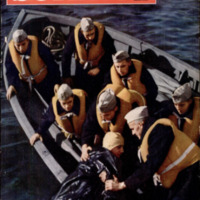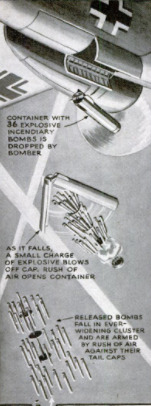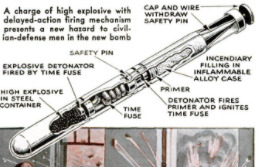How to fight new explosive incendiary
Item
-
Title (Dublin Core)
-
How to fight new explosive incendiary
-
Article Title and/or Image Caption (Dublin Core)
-
How to fight new explosive incendiary
-
extracted text (Extract Text)
-
A NEW type of incendiary bomb carrying a de-
layed-action explosive charge, now being used
extensively by both Germany and Japan, has made it
necessary for the Office of Civilian Defense to revise
its instructions on fire fighting. Because it is impos-
sible to tell when the bomb will explode—the time
fuse can be set to ignite anywhere up to seven
minutes after the bomb has struck—it is necessary
to use the greatest caution in fighting the blaze which
is set immediately on impact. Instead of water sprays,
sand, scoops, grabs, and snuffers, a strong jet of water
must be used. And most imperative, the user should
be behind a four-inch brick wall, or other barrier
equally strong, to protect himself from the bomb's
powerful fragmentation. Water is the best agent for
combatting this type of bomb, and civilian defense
authorities are emphasizing the need of keeping ade-
quate supplies on hand. Hot-water tanks, or storage
tanks for water heaters, can be used provided they
can be drained quickly. Once the bomb has exploded,
sand, sprays, and other means formerly advised, can
be employed to extinguish the fire.
-
Language (Dublin Core)
-
eng
-
Date Issued (Dublin Core)
-
1943-03
-
pages (Bibliographic Ontology)
-
115
-
Rights (Dublin Core)
-
Public Domain (Google Digitized)
-
Archived by (Dublin Core)
-
Matteo Ridolfi
-
Marco Bortolami (editor)
 Popular Science Monthly, v. 142, n. 3, 1943
Popular Science Monthly, v. 142, n. 3, 1943




